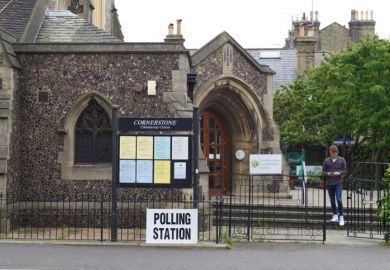Why do British university mission groups exist? I am not the first person to ask that question, and from their names (a number, a year, something they weren’t, a hotel) it is rather hard to tell. The recent demise of some – the 1994 Group, as well as several regional university bodies – and the success of others suggest that similarity of purpose is perhaps now less important than similarity of circumstance. And especially as we merge into a world of uncapped student competition, ultra-concentration of research funding and continuing policy blight.
Clearly, for a large number of universities in the capital, London is a highly defining feature. London is their biggest headache – estate, business, infrastructure, staffing costs – and also their biggest opportunity. London has a vibrant, diverse, younger population, hungry for all forms of knowledge.
December’s report by the All-Party Parliamentary Group on Social Mobility, Capital Mobility, rightly hails London as a “social mobility goldspot”. It vividly documents how initiatives such as the London Challenge and AimHigher have led to greater university participation from the fuller range of society, with over double the rate of participation by poor students than is the case in the rest of England. In fact, London has all but reached the 50 per cent participation target set by the previous government, and so cruelly denied to so many other parts of the country. Recent reports also indicate that research funding, especially for the big research toys, clusters increasingly in London and the South East of England.
London is different from the rest of the UK, and becoming more different. And it has, on its own, an economy as big as Austria’s
Migration figures tell us that, despite its costs, London remains a big lure. While MPs camp out at airports for a bit of Romanian- or Bulgarian-spotting, they perhaps should be looking at the internal migration within the UK arriving at London’s railway and bus stations. January’s Centre for Cities report shows that since 2009, the brain gain to London and the South East has been impressive and sustained. As The Guardian recently reported in “The Great Migration South”, there is a one-way population drift, even from London’s outer suburbs of Oxford and Cambridge. If, as claimed, 80 per cent of new private-sector jobs in England are actually in London, then that drift isn’t surprising. Nor is it surprising that London has a disproportionate share of the nation’s postgraduate students.
Behind the redrawing of Britain that has been going on since the crash of 2007-08 lies something more than rhetoric. London is different from the rest of the UK, and becoming more different. Its social attitudes to everything from European Union membership to gay marriage are different. And its population base is different. Within 20 years, on current projections, it will no longer be a “white British” city but a true “majority of minorities”. Indeed, London’s undergraduate populations, with healthy infusions of international students, have already got there.
But London is also becoming a larger part of the nation. Encouraged by governmental centralism, it dominates virtually all aspects of national life, unlike Berlin, New York or Beijing. Particularly through its financial services, it cross-subsidises the residue to an enormous and unrecognised extent.
London’s constant blah about being a “city-state”, with its medieval overtones, moved a decade ago into talk about being a “global city”. Even University College London started to advertise as “London’s Global University”. But why do we stop there?
If Scotland votes to leave the UK, or if the UK votes to leave the European Union, or if Boris Johnson fails to become the next prime minister, why doesn’t London look to become a “city nation” of its own? Frankly, does London need the rest of the UK?
Now, I’m not exactly suggesting a walled city, like pre-1989 Berlin, although the thought of Checkpoint Charlie at the Watford Gap is appealing. But London has, on its own, an economy as big as Austria’s. It still leads the world as a financial and media hub. And it has more universities than Australia. By one count or other, it might just scrape into the G20 in its own right.
The hole in the body of England would look a bit like today’s Europe, minus Switzerland. Indeed, the Swiss seem to have emulated their own cheese, with the results of their latest referendum affirming more controls on immigration, presumably with the aim of exiting Schengen and giving a harder edge to their national identity.
Interestingly, discounting its remnants (Gibraltar, St Helena, the Falkland Islands), the British Empire produces the best models of “city nations”. In 1965 Singapore decided to divorce itself from newly born Malaysia. Like London, it lacked natural resources, even its own water supply (not a problem for London just now) and had, as 1942 showed, limited self-defensive capacities.
But approaching its half-century, Singapore is a huge success, and a model for the global-cum-local tendencies of the 21st century. The skills and hard work of its people have made it one of the leading points of business in Southeast Asia. Its ethnic diversity, while still sometimes a flashpoint, is also an important spur to its continuing innovation.
Further north, Hong Kong is in effect also a “city nation”, although officially an autonomous region within China. Not only does it have a higher average standard of living that London, and decent rates of taxation, but it also has its own currency.
At a London Higher seminar on 10 February, Kit Malthouse, London’s deputy mayor, said: “Universities are the critical factor for London’s future economy”. Never a truer word. But perhaps a smart city could become an even smarter nation.
Register to continue
Why register?
- Registration is free and only takes a moment
- Once registered, you can read 3 articles a month
- Sign up for our newsletter
Subscribe
Or subscribe for unlimited access to:
- Unlimited access to news, views, insights & reviews
- Digital editions
- Digital access to THE’s university and college rankings analysis
Already registered or a current subscriber? Login





